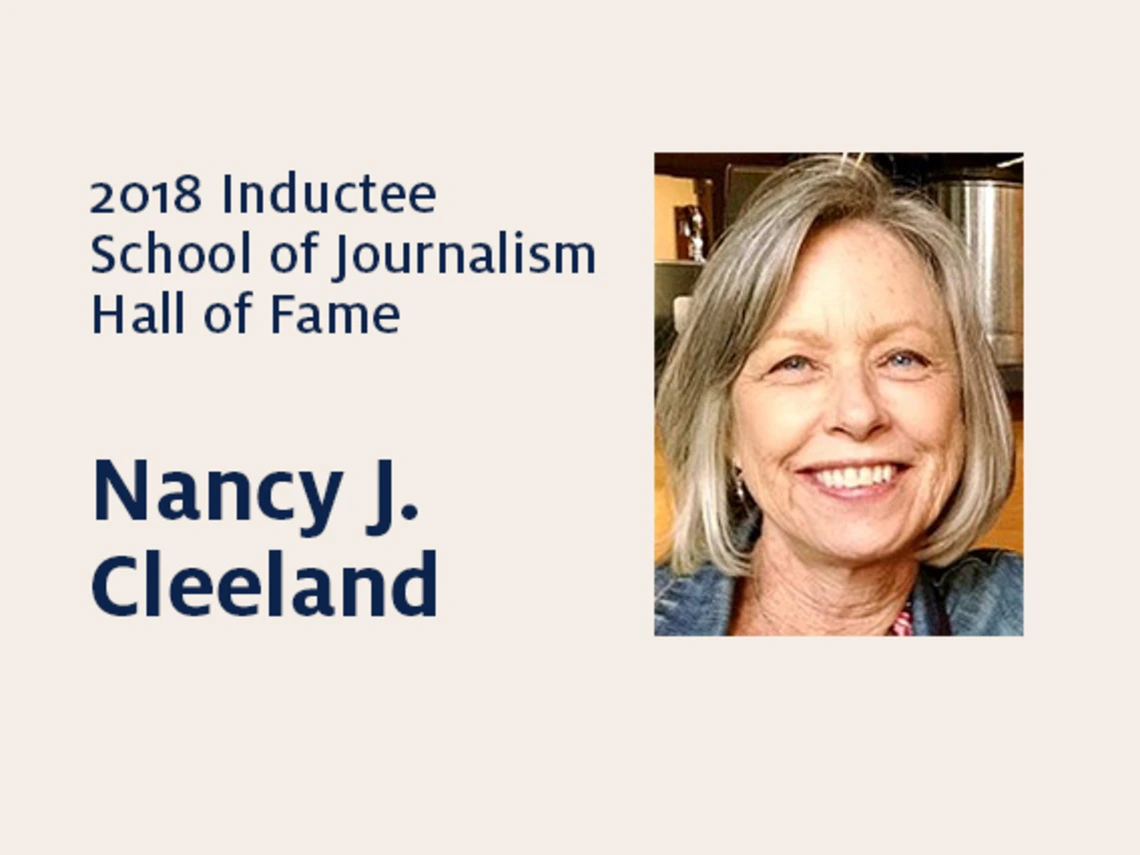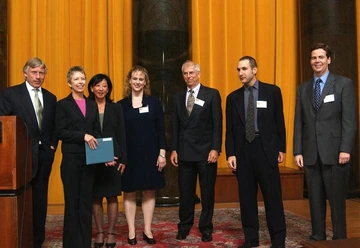Nancy J. Cleeland: 2018 Hall of Fame inductee

Nancy Cleeland, the lead reporter-writer on the 2004 Pulitzer Prize-winning series "The Walmart Effect," wrote with insight and authority on immigration, labor and trade over three decades at the Los Angeles Times and San Diego Union-Tribune.
Her journalism career took her around the world, including a three-year stint as a bureau chief in Mexico City and several years covering the U.S.-Mexico border from Tijuana. She reported from Vietnam, Cuba, Nicaragua, Haiti, Bolivia, Kenya and the former Soviet Union. Some of her most rewarding stories were closer to home, from the immigrant communities of Southern California, where she chronicled the exploitation of workers, their precarious living situations, and their struggle to maintain ties to their hometowns.
Ernest Sotomayor, a dean at the Columbia University School of Journalism, worked with Cleeland on the Arizona Daily Wildcat.
“Nancy and other fellow staff members always took our work as seriously as professional journalists anywhere, because we were professionals," he said. "She built on that experience, and her journalism at the Wildcat set a high standard for all of us to meet.”
After graduation from the UA School of Journalism in 1977, she began her career as a summer reporter for the Associated Press in Tucson. She then moved to the Blade-Tribune in Oceanside, California.
The San Diego Union then hired her as an outdoor writer. After a year off to travel across South America, she returned to the Union to cover international stories as well. At one point, Cleeland accompanied a group of veterans returning to Vietnam to unite with children they had fathered and left behind. Her stories earned the 1989 top prize for print journalism from the Asian American Journalists Association.
In 1990, the San Diego Union-Tribune chose Cleeland to direct its bureau in Mexico City. She then joined the Los Angeles Times to cover immigration in Orange County, and later she moved to Los Angeles to cover the labor beat.
Cleeland initiated the idea for a series on how Walmart’s drive for lower retail prices had impacted international labor practices. Her byline appeared on five series stories. It earned the George Polk Award and the 2004 Pulitzer Prize in national reporting.
The Pulitzer judges awarded Cleeland and her L.A. Times' colleagues for their "engrossing examination of the tactics that have made Wal-Mart the largest company in the world with cascading effects across American towns and developing countries."
(Read the Walmart series)
In 2006, Cleeland took a buyout from the Times. Since then, Cleeland has worked as a writer, editor and media relations professional on labor-related issues. She is currently deputy director of communications at OSHA in the Department of Labor.
She was inducted into the Arizona Daily Wildcat Hall of Fame in 2006.
— Donald W. Carson, '54


NANCY CLEELAND: IN HER WORDS
Biggest influence at UA
"I wouldn't have been a journalist without Don Carson. He believed in me and encouraged me as a U of A student when I thought I didn't have what it takes and briefly switched majors to wildlife biology. Don stayed in touch and was happy to welcome me back when I realized journalism was my true calling. Don brought veteran working journalists into our classroom so we would know the real deal. Among them was Don Bolles, the crusading Arizona Republic investigative reporter who was killed by a car bomb a few months later. When I graduated, Don recommended me for a vacation relief job at the Tucson AP - a two month assignment that set me off on my career. I went on to have a life of great adventure, reporting from countries around the world, eventually landing with the LATimes, where I worked on big projects. But I wouldn't have experienced any of that if not for the confidence that Don Carson inspired in me. That's why he was the first person I called when I found out a project I'd worked on won a Pulitzer. He was more responsible for that than anyone. I know I was just one of thousands of aspiring journalists who were toughened up and supported at the same time by Don. His legacy is a generation of inspired reporting."
On covering her beat
"In a way, the Los Angeles Times created my obsession for economic and class issues by sending me into low-wage Los Angeles as part of a 1998 initiative to increase coverage of Latinos. I was a seasoned journalist with lots of experience in Third World countries. Still, the level of exploitation I saw shocked me. Illegal immigrants, in particular, had no rights. In a range of industries, including manufacturing and retail, they were routinely underpaid and fired after any attempt to assert rights or ask for higher wages."

